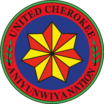Communication Fees Due January 2017
$40.00 per household
Make checks payable to UCAN and mail to: UCAN / PO Box 754 / Guntersville, AL 35976
It is our prayer that some day we will not have to ask the citizens of United Cherokee AniYunWiYa Nation to provide monies to help with expenses. For now it is the only way we are able to do a great number of things, especially communicate. Although we have grants that help cushion our expenses they do not begin to cover the monthly expenses of maintaining an office as well as the cost of internet and the websites necessary to stay in touch, educate and promote our tribal business AIR. The UCAN website is back up and operational thanks to the response last year to our reminder to please send in your Communication Fees. There is still a lot more work to be done to have it where we would like for it to be, but we are working on updating it and adding more to it. There is currently a calendar of events and the videos of Chief Gina Williamson’s Memorial/Celebration of Life Service. We hope to be able to add Legends and other topics of interest as well. If you have any ideas or suggestions please feel free to email those to us at ucanonline@bellsouth.net. If you would like to check out our websites the addresses for these are:
UCAN’s website: www.ucan-online.org
AIR’s website: www.air-corp.org.
As you can tell by this post / email we have made the decision to go green. We just do not get enough funding in to cover the expense of a printed newsletter or the cost of postage to send this out. We pray that if you have a family member or friend who is a tribal citizen and does not have access to a computer that you would share this with them as well. If your address or email has changed please send an email to either ucanonline@bellsouth.net or dixonzoo@aol.com with that information so we can update our records. We will be sending out postcard reminders in late December or early January, if you have already sent your Annual Fees in and receive the postcard please feel free to send us an email reminding us.
Thank You for all your support!
Humanki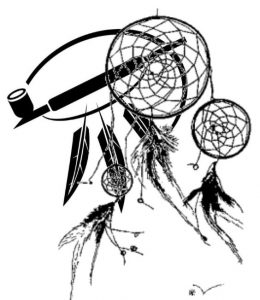 nd has not woven the web of life.
nd has not woven the web of life.
We are but one thread within it.
Whatever we do to the web, we do to ourselves. All things are bound together.
All things connect.
– Chief Seattle –
Gossip Hurts Everyone
Once there was a woman in a village who did not have much to do and she became angry at one of her neighbors. So she started a rumor, planted an evil seed that would hurt the neighbors reputation and make others think less of her. This made the woman feel very powerful and in control. By bedtime the woman felt badly and the next morning hurried to one of the Elders. She wanted to ask the Elder to help her overcome this evil. On the way to the Elders home that morning she could hear the people in the village whispering about her neighbor and of course, the story had been added on to.
The Elder listened to the woman and when she finished, he told her to go to the bird coop and pick out one bird, ring his neck and then go around the entire village plucking the bird, but to be sure and bring the last feather back to him. The woman anxious to undo the damage hurried to do what the Elder had told her. When she brought the last feather back to the Elder she asked for further instructions. The Elder told her to go home and come back in the morning.
The woman did not sleep at all and hurried to the Elder the next morning again hearing fragments of the words she had started two days before throughout the village as she went to the Elders home. When she reached the Elder, she was very upset and told the Elder, the words she had started were even worse than the day before. After listening, the Elder told the woman to get a pouch and go back to the place of origin and pick up all the feathers from the day before.
The woman hurried to pick up the feathers and eventually returned to the Elder. She told the Elder she picked up all the feathers she could, but could not get all of them because the wind had carried some of the feathers away and the children had picked them up and played games with them and some were taken other places for other reasons. The Elder said, what you have done is punishable by death by our people and you know this. By tradition, you have not sought out your sister to tell her what was on your heart, instead you went behind her back because the truth would not allow you to face her. Momentarily, you gained power by talking about your neighbor who was not there to defend herself. The words you spoke against this person is like the feathers taken by the wind. Because you did not follow tradition and the ways of our Creator with your tongue, you cannot undo what you have done. You have shamed our people by placing yourself above the truth and the teachings of our ancestors and now you must live with the knowledge you have damaged more than one life, you have hurt us all. You have used your own people as a weapon against your neighbor who has done nothing to you, but because you were jealous or envious or because she disagreed with you, you have divided our people through your actions. He then handed her the feather she had given him the day before as a reminder of the cancer she had started.
Prayer List
There  are many that need our prayers: Art Wade, Bob Lytel, Janet Martin, Gene Gold, Aiden Warrior, Vedder, Kayleigh, Dennis’ nephew Shawn, Donna Cole’s cousin Matt, White Wolf Newman and his wife Sarah, Leon Williamson, Sam Wisner, Dan Wisner, Brandy Taylor-Thompson, Josh Henson, Roger & Jill White, Ernie Oden, Donny, Lisa Bonta, Janet Smith, the Fry family, Buddy Stone, Sandi Peschke, Rea Reilly, the Bridges family, the Collard family, Bob Upton and his sister, Martha Kennedy, Lacy Campbell, Gaylene Shipp, Tim Purdy, Reesa Gentle and her sister Mary Gold, Doc Zeke Allen’s family, Misty Atwater, Danny Perry, Anthony Shayne Williams.
are many that need our prayers: Art Wade, Bob Lytel, Janet Martin, Gene Gold, Aiden Warrior, Vedder, Kayleigh, Dennis’ nephew Shawn, Donna Cole’s cousin Matt, White Wolf Newman and his wife Sarah, Leon Williamson, Sam Wisner, Dan Wisner, Brandy Taylor-Thompson, Josh Henson, Roger & Jill White, Ernie Oden, Donny, Lisa Bonta, Janet Smith, the Fry family, Buddy Stone, Sandi Peschke, Rea Reilly, the Bridges family, the Collard family, Bob Upton and his sister, Martha Kennedy, Lacy Campbell, Gaylene Shipp, Tim Purdy, Reesa Gentle and her sister Mary Gold, Doc Zeke Allen’s family, Misty Atwater, Danny Perry, Anthony Shayne Williams.
LIHEAP
(Low Income Home Energy Assistance Program a.k.a Community Action Grant)
We have been blessed to be awarded this grant again for 2017. The funds are currently available.
These funds are being made available by the Department of Health and Human Services for enrolled citizens of United Cherokee AniYunWiYa living in Blount, Calhoun, Cleburne, Cherokee, Colbert, Cullman, Dekalb, Etowah, Fayette, Franklin, Jackson, Jefferson, Lamar, Lauderdale, Lawrence, Limestone, Madison, Marion, Marshall, Morgan, St. Clair, Walker and Winston Counties, in Alabama.
The funding is to help cover the cost of one heating bill and one cooling bill per household per year. There is a chart on the application that covers the income limits.
Due to the limited funding available for Weatherization there will not be any applications accepted for this until the end of the Fiscal Year, around August. This will be a first come first served basis with an exception being made for those in poor health or with medical conditions requiring special consideration. If you have used the Weatherization program in the past 5 or 6 years we ask that you show consideration for those who have not had the opportunity to use these funds. If you have had Weatherization done on your home two or more times you will no longer qualify for this portion of the grant because of the limited amount of funds we will be able to use for this program. We also request that you call prior to sending in your utility bill to verify that there are funds available so we can mail you a current application. Follow the instructions on the applications when applying. If you are on a disconnect Do NOT wait until the night before or the day of the disconnect and contact us and expect that we will be able to prevent this from taking place. We have to have time to contact the Utility company and request an extension. Most of the time they are willing to work with us and give an extension but that is not guaranteed and there may be steps they request in order to grant this extension, so please allow us time to make the arrangements. One of the main requirements to be eligible is that the utility bill Must be in your name or your spouse living with you. If you do not submit all the necessary paperwork you will not be eligible for assistance. Any attempts of fraud will result in becoming Permanently Ineligible for assistance from our grant program. We will not jeopardize this assistance so desperately needed by so many families. There are NO exceptions to this policy.
Alabama Indian Affairs Commission
2017 Scholarships
Scholarship applications for 2017 usually become available around January on the AIAC website. Once these are available we will post a link on our facebook page as well as on the UCAN website. Here were the requirements from last year:
Basic Criteria to Apply for AIAC Scholarship
- Must be enrolled in a federal/state recognized Tribe for a minimum of three (3) years ANDmeet your Tribe’s internal qualifications. [Some Tribes have additional requirementsfor you to compete for one of their scholarship allocations. Check with your Tribe as their signature approving your application is required;
- Must be an Alabama resident;
- Must attach proof of acceptance or current enrolment from the school you plan to attend (school must be located in the State of Alabama unless the courses needed are not offered in Alabama).
- Special consideration will be given to Nurse, Medical, Veterinary, and Pharmacymajors. Due to the limited number of seats available in Alabama for these degrees, students who have applied for and failed to gain admissions into these programs in Alabama will be allowed to transfer their scholarships to out of state programs. Proof of application and non-acceptance must be provided before the transfer will be approved.
United Cherokee AniYunWiYa Nation requires a minimum of 16 volunteer hours. Our PowWow is held in April of every year and is our biggest event in which we have the most need of volunteers. If you intend to apply for the scholarship in 2017 you should have gotten your volunteer hours in at the 2016 Pow Wow. We do not have any other events scheduled for 2016 in which to qualify for volunteer hours. If you are a student or parent of a student who will be graduating in 2018 and would like to apply for the scholarships in 2018 please make sure to watch our posts concerning the 2017 PowWow in April so you will know when to sign up to volunteer to be eligible for the 2018 scholarships.
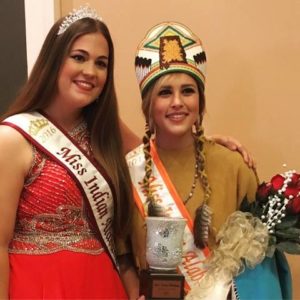
2017
Miss Indian Alabama
Congratulations!
Miss Caitlyn Evatt
Citizen of Cherokee Tribe of Northeast Alabama
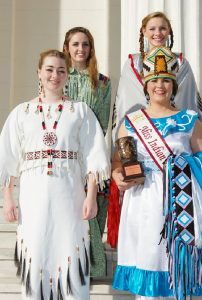 2016
2016
Miss Indian Alabama
Citizen of
United Cherokee AniYunWiYa Nation
The month of November is designated as American Indian Heritage month. Throughout the nation Indian events are held to commemorate the rich heritage of Native peoples. In Alabama a series of events and activities have been held by the tribes and other Indian related organizations, in support of Alabama’s Indian heritage.
On Friday, November 4, the Alabama Indian Affairs Commission hosted the Miss Indian Alabama competition at the State Capitol. The Commission is the state government agency that is charged with representing the Indian people living in the state, as well as the nine recognized tribal governments. The state of Alabama is home to the following state-recognized tribal governments; Echota Cherokee Tribe of Alabama, Cherokee Tribe of Northeast Alabama, MaChis Lower Creek Indian Tribe, Star Clan of Muscogee Creeks, Cher-O-Creek Intratribal Indians, MOWA Band of Choctaw Indians, Piqua Shawnee Tribe, the United AniYunWiYa Nation and the Poarch Band of Creeks Indians who are also federally recognized.
2016 Walk in Memory of Trail of Tears
Waterloo, Alabama
2016 was my first year not only attending the Trail of Tears Commemoration in Waterloo, AL, it was also my first year coordinating UCAN’s involvement with the PowWow and serving as the Principal Chief. Since this was the one event I was not involved with during the planning phase previously, it became evident I have a lot to learn and most importantly I am blessed beyond words with a support team that is just amazing. There were a few hiccups along the way and the Creator blessed us with the last rain we have seen in awhile, but it was a humbling and uplifting weekend spent with family, friends and a community that took really good care of us all. We were welcomed with open arms and shown a great deal of support by the Mayor and visitors of Waterloo. At the end of the commemoration walk we were able to scatter the ashes of our precious Chief and Sister Chief Gina “Stillwaters” Williamson. As difficult as it was to say ‘until we meet again’, it was also comforting knowing she is with us always and has been honored and remembered with a tile placed at the end of the walk. I look forward to next year. I hope to see you all there. Judy Dixon
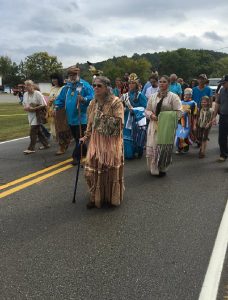
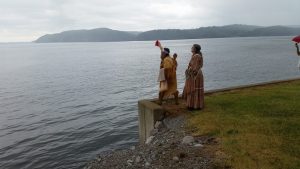
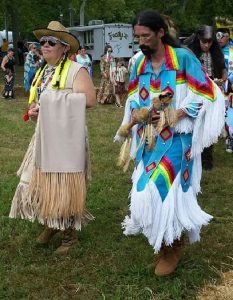
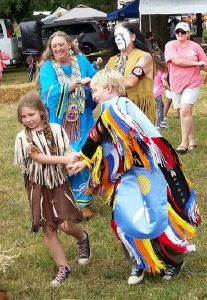
Calendar of Events:
Thursday, November 24, 2016—Thanksgiving (Our office will be closed Thursday, Nov.24, 2016 and Friday, Nov. 25, 2016 for Thanksgiving. We will reopen our regular hours and schedule Tuesday, November 29, 2016)
Sunday, December 11, 2016—Fellowship Gathering 1:00 pm at UCAN Tribal Office located at 1531 Blount Avenue / Guntersville, AL. This is a covered dish luncheon so please bring something to share.
The week of Christmas 2016, Dec. 25th we will close our office so our volunteers may have some time to spend with their families and have a much deserved vacation. We will reopen our regular hours and schedule Tuesday, January 3, 2017. If you are in need of assistance through our LIHEAP program and it cannot wait until our office reopens please send an email to Chief Judy Dixon at either dixonzoo@aol.com or ucanonline@bellsouth.net
Sunday, January 8, 2017—Fellowship Gathering This will be our Shake Out Your Regalia gathering.
Sunday, February 12, 2017—Fellowship Gathering .
Sunday, March 12, 2017 -Fellowship Gathering
Sunday, April 9, 2017—Fellowship Gathering
Saturday, April 29, 2017—Sunday, April 30, 2107 (this is not a definite date, still in the planning stage)
UCAN’s 19th Annual Festival and American Indian Pow Wow
May 2017—We do not have Fellowship Gathering in May so everyone can enjoy Mother’s Day and a chance to rest up after PowWow.
Sunday, June 11, 2017—Fellowship Gathering
Sunday, July 9, 2017—Fellowship Gathering
Sunday, August 13, 2017—Fellowship Gathering
We hope to schedule guest speakers as well as possible crafting classes for our Fellowship Gatherings so keep watching our facebook page and website for updates.
We should begin holding Pow Wow Committee Meetings beginning December or early January (check our facebook page and website for current schedules).
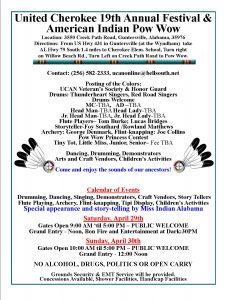
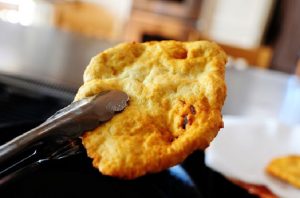
Fry Bread Anyone?
It is the same every year, a rumor starts going around that our source for Fry Bread mix has gone away. We begin scrambling, and begging for fry bread recipes only to find out that the rumors are untrue. Now we have all these recipes, so what do you do with them? Well, I think I’m gonna stick them right here. Or at least some of them. Now ya’ll can try them out and let us know which one you think is the best. I’m serious I want emails telling us which ones you like best. You can even send us your recipes if you have one you like better. You can either email us at: ucanonline@bellsouth.net or your can send it to my personal email at dixonzoo@aol.com.—Thank You, Judy
Here’s the long Momma version
3 1/4 cups all purpose flour
1/2 tsp salt
1 cup ice water
1 cup powdered milk
5 TBSP lard plus 1 cup lard
1 TBSP baking powder
Stir milk, baking powder, flour and salt together.
Cut in 5 TBSP of lard to make it look like cornmeal
Add the ice water and mix till the dough is smooth
Cover with a towel and let the dough rest at room temperature for 2 hours
Divide the dough and shape into balls
Stretch or roll out and cut but let rest. Poke hole in the center.
Heat the remaining lard until a pinch of the dough dances to the top not till its smoking.
Shape the dough and make sure there’s a hole or it will puff up toooo much.
Fry till brown.
Lakota Fry Bread
For a large gathering or PowWow
5 pounds flour
6 cups warm water
2 packages yeast or 2 TBSP powdered yeast
1/2 cup sugar
1 teaspoon salt
1/2 cup milk—liquid or powdered
1 cup oil or melted lard
Put 6 cups water in large bowl
Add 2 packages yeast, stir until yeast dissolves
Add 1 teaspoon salt, milk and oil
Stir until all is dissolved
Add 2 to 3 cups of flour at a time
Mix well until all flour is mixed and it forms a ball of dough
Knead until dough stays together
Cover with wax paper and towel and let sit 30 minutes
Set heat to around 365 degrees
Start oil in cooker
Time to knead dough again
Oil your hands so it don’t stick
Pinch off a little ball to test the oil.
Takes about 1 min on each side
Poke a small hole in the center.
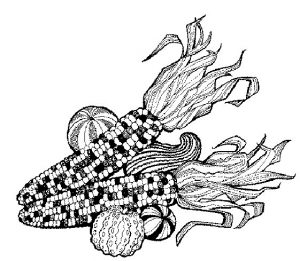
Cherokee Legend of Maize
Submitted by James “Night Eagle” Dunn
Many moons ago, the KahKan Konty told how the great spirit appeared to a wise forefather and showed him the plant maize.
The great spirit told him to preserve the two ears on the plant until the next spring, and then to plant the kernels after the first call of the whippoorwill. He should preserve the whole crop and send two ears to each of the surrounding Nations, with instructions to do the same as above until their third crop. By this means the corn was distributed among all people.

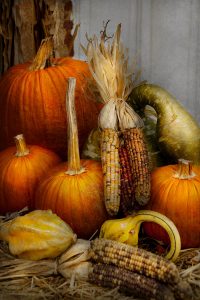
The Pilgrims crossed the Atlantic Ocean in 1620, they landed on the rocky shores of a territory that was inhabited by the Wampanoag (Wam pa NO ag) Indians. The Wampanoags were part of the Algonkian-speaking peoples, a large group that was part of the Woodland Culture area. The Wampanoags Indians lived in villages along the coast of what is now Massachusetts and Rhode Island. They lived in round-roofed houses called wigwams. These were made of poles covered with flat sheets of elm or birch bark. Wigwams differ in construction from tipis that were used by Indians of the Great Plains.
The Wampanoags moved several times during each year in order to get food. In the spring they would fish in the rivers for salmon and herring. During the planting season they moved to the forest to hunt deer and other animals. After the hunting season ended people moved inland where there was greater protection from the weather. From December to April they lived on food that they stored during the earlier months.
The basic dress for men was the breech clout, a length of deerskin looped over a belt in back and in front. Women wore deerskin wrap-around skirts. Deerskin leggings and fur capes made from deer, beaver, otter, and bear skins gave protection during the colder seasons, and deerskin moccasins were worn on the feet. Both men and women usually braided their hair and a single feather was often worn in the back of the hair by men. They did not have the large feathered headdresses worn by people in the Plains Culture area.
There were two language groups of Indians in New England at this time. The Iroquois were neighbors to the Algonkian-speaking people. Leaders of the Algonquin and Iroquois people were called “sachems” (SAY chems). Each village had its own sachem and tribal council. Political power flowed upward from the people. Any individual, man or woman, could participate, but among the Algonquins more political power was held by men. Among the Iroquois, however, women held the deciding vote in the final selection of who would represent the group. Both men and women enforced the laws of the village and helped solve problems. The details of their democratic system were so impressive that about 150 years later Benjamin Franklin invited the Iroquois to Albany, New York, to explain their system to a delegation who then developed the “Albany Plan of Union.” This document later served as a model for the Articles of Confederation and the Constitution of the United States.
These Indians of the Eastern Woodlands called the turtle, the deer and the fish their brothers. They respected the forest and everything in it as equals. Whenever a hunter made a kill, he was careful to leave behind some bones or meat as a spiritual offering, to help other animals survive. Not to do so would be considered greedy. The Wampanoags also treated each other with respect. Any visitor to a Wampanoag home was provided with a share of whatever food the family had, even if the supply was low. This same courtesy was extended to the Pilgrims when they met.
We can only guess what the Wampanoags must have thought when they first saw the strange ships of the Pilgrims arriving on their shores. But their custom was to help visitors, and they treated the newcomers with courtesy. It was mainly because of their kindness that the Pilgrims survived at all. The wheat the Pilgrims had brought with them to plant would not grow in the rocky soil. They needed to learn new ways for a new world, and the man who came to help them was called “Tisquantum” (Tis SKWAN tum) or “Squanto” (SKWAN toe).
Squanto was originally from the village of Patuxet (Pa TUK et) and a member of the Pokanokit Wampanoag nation. Patuxet once stood on the exact site where the Pilgrims built Plymouth. In 1605, fifteen years before the Pilgrims came, Squanto went to England with a friendly English explorer named John Weymouth. He had many adventures and learned to speak English. Squanto came back to New England with Captain Weymouth. Later Squanto was captured by a British slaver who raided the village and sold Squanto to the Spanish in the Caribbean Islands. A Spanish Franciscan priest befriended Squanto and helped him to get to Spain and later on a ship to England. Squanto then found Captain Weymouth, who paid his way back to his homeland. In England Squanto met Samoset of the Wabanake (Wab NAH key) Tribe, who had also left his native home with an English explorer. They both returned together to Patuxet in 1620. When they arrived, the village was deserted and there were skeletons everywhere. Everyone in the village had died from an illness the English slavers had left behind. Squanto and Samoset went to stay with a neighboring village of Wampanoags.
One year later, in the spring, Squanto and Samoset were hunting along the beach near Patuxet. They were startled to see people from England in their deserted village. For several days, they stayed nearby observing the newcomers. Finally they decided to approach them. Samoset walked into the village and said “welcome,” Squanto soon joined him. The Pilgrims were very surprised to meet two Indians who spoke English.
The Pilgrims were not in good condition. They were living in dirt-covered shelters, there was a shortage of food, and nearly half of them had died during the winter. They obviously needed help and the two men were a welcome sight. Squanto, who probably knew more English than any other Indian in North America at that time, decided to stay with the Pilgrims for the next few months and teach them how to survive in this new place. He brought them deer meat and beaver skins. He taught them how to cultivate corn and other new vegetables and how to build Indian-style houses. He pointed out poisonous plants and showed how other plants could be used as medicine. He explained how to dig and cook clams, how to get sap from the maple trees, use fish for fertilizer, and dozens of other skills needed for their survival.
By the time fall arrived things were going much better for the Pilgrims, thanks to the help they had received. The corn they planted had grown well. There was enough food to last the winter. They were living comfortably in their Indian-style wigwams and had also managed to build one European-style building out of squared logs. This was their church. They were now in better health, and they knew more about surviving in this new land. The Pilgrims decided to have a thanksgiving feast to celebrate their good fortune. They had observed thanksgiving feasts in November as religious obligations in England for many years before coming to the New World.
The Algonkian tribes held six thanksgiving festivals during the year. The beginning of the Algonkian year was marked by the Maple Dance which gave thanks to the Creator for the maple tree and its syrup. This ceremony occurred when the weather was warm enough for the sap to run in the maple trees, sometimes as early as February. Second was the planting feast, where the seeds were blessed. The strawberry festival was next, celebrating the first fruits of the season. Summer brought the green corn festival to give thanks for the ripening corn. In late fall, the harvest festival gave thanks for the food they had grown. Mid-winter was the last ceremony of the old year. When the Indians sat down to the “first Thanksgiving” with the Pilgrims, it was really the fifth thanksgiving of the year for them!
Captain Miles Standish, the leader of the Pilgrims, invited Squanto, Samoset, Massasoit (the leader of the Wampanoags), and their immediate families to join them for a celebration, but they had no idea how big Indian families could be. As the Thanksgiving feast began, the Pilgrims were overwhelmed at the large turnout of ninety relatives that Squanto and Samoset brought with them. The Pilgrims were not prepared to feed a gathering of people that large for three days. Seeing this, Massasoit gave orders to his men within the first hour of his arrival to go home and get more food. Thus it happened that the Indians supplied the majority of the food: Five deer, many wild turkeys, fish, beans, squash, corn soup, corn bread, and berries. Captain Standish sat at one end of a long table and the Clan Chief Massasoit sat at the other end. For the first time the Wampanoag people were sitting at a table to eat instead of on mats or furs spread on the ground. The Indian women sat together with the Indian men to eat. The Plgrim women, however, stood quietly behind the table and waited until after their men had eaten, since that was their custom.
For three days the Wampanoags feasted with the Pilgrims. It was a special time of friendship between two very different groups of people. A peace and friendship agreement was made between Massasoit and Miles Standish giving the Pilgrims the clearing in the forest where the old Patuxet village once stood to build their new town of Plymouth.
It would be very good to say that this friendship lasted a long time; but, unfortunately, that was not to be. More English people came to America, and they were not in need of help from the Indians as were the original Pilgrims. Many of the newcomers forgot the help the Indians had given them. Mistrust started to grow and the friendship weakened. The Pilgrims started telling their Indian neighbors that their Indian religion and Indian customs were wrong. The Pilgrims displayed an intolerance toward the Indian religion similar to the intolerance displayed toward the less popular religions in Europe. The relationship deteriorated and within a few years the children of the people who ate together at the first Thanksgiving were killing one another in what came to be called King Phillip’s War.
It is sad to think that this happened, but it is important to understand all of the story and not just the happy part. Today the town of Plymouth Rock has a Thanksgiving ceremony each year in remembrance of the first Thanksgiving. There are still Wampanoag people living in Massachusetts. In 1970, they asked one of them to speak at the ceremony to mark the 350th anniversary of the Pilgrim’s arrival. Here is part of what was said:
“Today is a time of celebrating for you — a time of looking back to the first days of white people in America. But it is not a time of celebrating for me. It is with a heavy heart that I look back upon what happened to my People. When the Pilgrims arrived, we, the Wampanoags, welcomed them with open arms, little knowing that it was the beginning of the end. That before 50 years were to pass, the Wampanoag would no longer be a tribe. That we and other Indians living near the settlers would be killed by their guns or dead from diseases that we caught from them. Let us always remember, the Indian is and was just as human as the white people.
Although our way of life is almost gone, we, the Wampanoags, still walk the lands of Massachusetts. What has happened cannot be changed. But today we work toward a better America, a more Indian America where people and nature once again are important.”
United Cherokee AniYunWiYa Nation
Food Pantry
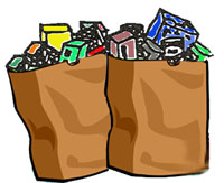
Thank You to all who have donated and made our Food Pantry possible!
Cherokee Language
Although we do not currently have a language class scheduled there are several who are making attempts at learning the language. Tom Burke had the privilege of attending a language class that was previously offered at the tribal office and picked up several words and caught on to the use of the syllabary and pronunciation. Josh Henson also has a good knowledge of the language and has been tutoring. Thanks to both of them and discovering previous language class material I am making an effort to learn as well. I have found that by using just one phrase at a time for an extended period of time I am finally able to make progress. Yeah it is just a few small, basic phrases, but progress is progress. We hope to one day offer another language class, but in the meantime I would like to share my journey with our language with you. I have been posting with my morning prayers the first phrase or two that I have learned so far.
The first phrase I began practicing is:
Osda Sunalei
pronounced oh s dah soo nah lay ee
This means Good Morning
The second phrase I am practicing now is:
Do hi tsu?
pronounced doh hee joo
This means How are you?
If we continue to practice one word or phrase at a time I believe that in time we will have a better grasp of our language. If you would like to continue this journey with us keep watching our facebook page and we may even include something on our tribes website similar to what we are doing on the facebook page. If you have a word or phrase you would like for us to work on please email it to ucanonline@bellsouth.net or dixonzoo@aol.com or private message me on facebook. Remember to include the pronunciation as well.
Wado,
Judy
United Cherokee AniYunWiYa Nation
Contact Information:
Tribal Council:
Principal Chief
Judy Dixon
dixonzoo@aol.com or
ucanonline@bellsouth.net
Vice Deputy Chief
Lowrey Hesse
tlkstone@charter.net
Secretary
Mara Burke
Treasurer
Donna Bridges
Glen Hale
Rowland Matthews
George Denmark
Sherman Dobson
Elders:
Leon Williamson Head Elder
Doris Trevino
Donnia Monroe
Betty Burton
Butch Richardson
Roger White
Don Phillips
If you need to contact any of the Council or Elders please send an email request to either ucanonline@bellsouth.net or
dixonzoo@aol.com and we will make sure that they receive your request
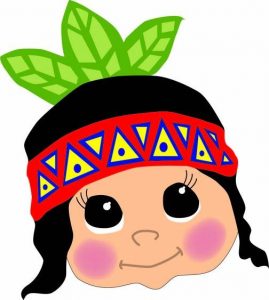 American Indian Resources
American Indian Resources
1531 Blount Avenue
Guntersville, AL 35976

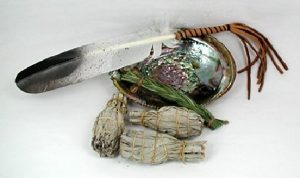
AN INDIAN PRAYER
OH GREAT SPIRIT, Whose voice I hear in the winds, And who’s breath gives life to all the world, hear me!
I am small and weak,
I need your strength and wisdom.
Let me walk in beauty,
and make my eyes ever behold the red and purple sunset.
Make my hands respect the things
you have made and my ears sharp
to hear your voice.
Make me wise so that I may
understand the things you have taught my people. Let me learn the lessons you have hidden in
every leaf and rock.
I seek strength, not to be greater than my brother, but to fight my greatest enemy — myself.
Make me always ready to come to you with clean hands and straight eyes. So when life fades, as the fading sunset,
my spirit may come to you without shame.
